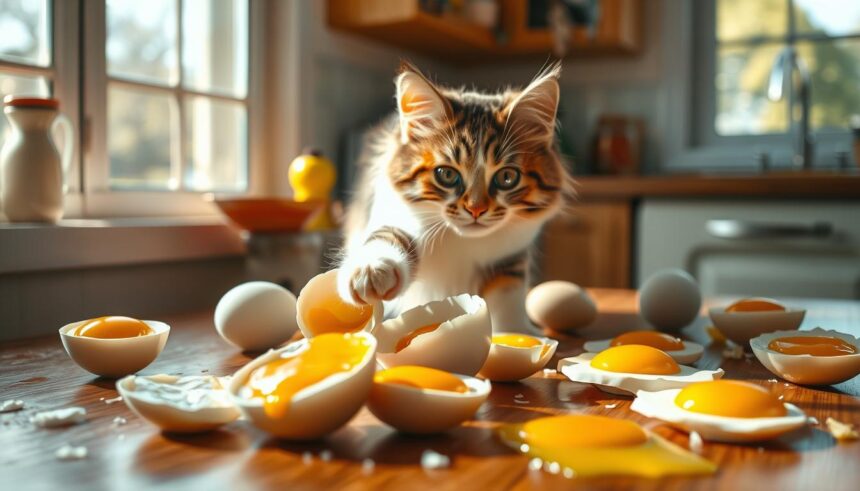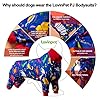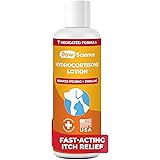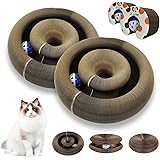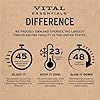As a cat owner, you might wonder if eggs are safe for your pet. The answer is yes, cats can eat eggs. But, it’s important to know the risks and benefits. Eggs are good for cats because they have protein, healthy fats, and amino acids.
However, eggs should be given in small amounts. They can be too rich and might cause weight gain or health problems. To learn more about eggs in a cat’s diet, visit can cat eat eggs.
Feeding eggs to cats needs careful thought about their safety and nutrition. Cooked eggs are easy for cats to digest. They can be a good part of a cat’s meal. But, only give a small amount of egg at a time.
Eggs are high in calories and can lead to weight gain. A cat’s diet should be balanced, with eggs making up no more than 15% of their daily calories. Always talk to a vet before adding eggs to your cat’s diet. This ensures your cat gets the right nutrients.
Key Takeaways
- Cats can eat eggs in moderation, but it’s essential to consider the risks and benefits.
- Eggs provide essential nutrients like protein, healthy fats, and amino acids.
- Cooked eggs are safe for cats to eat, but raw eggs may pose health risks.
- Eggs should make up no more than 15% of a cat’s daily calorie intake.
- It’s recommended to serve no more than half of a small portion of a single egg to a cat in one sitting.
- A balanced and varied cat egg diet is crucial for maintaining a cat’s overall health and well-being.
- Consulting with a veterinarian is essential to determine the best approach for incorporating eggs into a cat’s diet, ensuring it is safe for cats.
Nutritional Benefits of Eggs for Cats
Eggs are a nutrient-rich food that can provide cats with essential protein, vitamins, and minerals. They are a valuable addition to a cat’s diet. Eggs are an excellent source of protein, containing eleven essential amino acids. Ten of these amino acids are specifically relevant to feline dietary needs.
When considering protein sources for cats, eggs are a great option. Cats need about 60% of their diet to be protein-rich. This supports strong muscles and a healthy coat. Eggs also contain vitamins like B12, which is critical for a cat’s energy metabolism. They also have minerals such as iron and selenium, which are vital for a cat’s immune system.
In terms of cat health benefits, eggs can contribute to a balanced diet when fed in moderation. However, it’s essential to note that eggs should only constitute about 10% or less of a cat’s total diet. This prevents obesity and gastrointestinal upset. The amount of egg given to cats should not exceed 10% of their daily calorie intake. One tablespoon of egg whites is recommended as a sufficient supplement to a cat’s daily diet.
- High-quality protein source
- Rich in essential vitamins and minerals
- Supports strong muscles and healthy coat
- Contributes to a balanced diet when fed in moderation
By incorporating eggs into a cat’s diet, owners can provide their pets with a nutrient-rich food. This supports overall health and well-being. It aligns with the principles of feline nutrition and protein sources for cats. It ultimately promotes cat health benefits.
Can Cats Eat Raw Eggs?
Feeding raw eggs to cats can be risky. It can lead to Salmonella and biotin deficiency. Eggs are nutritious, but raw eggs have dangers. Cats eating raw eggs might get Salmonella, which is bad for kittens and older cats.
Adult cats might not get very sick from Salmonella. But, raw egg whites can cause biotin deficiency. This can harm their skin, coat, and even their brain.
Risks of Feeding Raw Eggs
- Raw eggs may contain Salmonella, a bacteria linked to food poisoning
- Biotin deficiency caused by avidin in raw egg whites can lead to skin and coat problems, gastrointestinal issues, and neurological issues
- Raw eggs can contain harmful bacteria such as E. coli and Salmonella, which pose a risk not only to cats but also to humans
Nutritional Concerns with Raw Eggs
Cooking eggs makes them safer for cats. Poached eggs are the best choice. About 30% of cats might have egg allergies. This can cause itching, vomiting, and diarrhea.
In summary, eggs can be part of a cat’s diet but not a mainstay. Always talk to a vet before adding eggs. Knowing the signs of egg allergies in cats is key to their health.
| Egg Type | Safety for Cats |
|---|---|
| Cooked Eggs | Safe, but should be fed in moderation |
| Raw Eggs | Not safe due to risk of Salmonella and biotin deficiency |
Can Cats Eat Cooked Eggs?
Cooked eggs are a nutritious and safe choice for cats, as long as they follow cat dietary guidelines. It’s important to think about how the eggs are cooked and how much to give. This ensures the cat gets the nutrients they need without any health risks.
Cooking eggs makes them easier for cats to digest. It also removes the risk of salmonella. You can boil, scramble, or bake eggs. Just make sure they’re cooked well to avoid bacteria.
Here are some benefits of cooking eggs for cats:
- Easy to digest
- Reduced risk of salmonella
- Can be served as a treat or meal topper
When giving cooked eggs to cats, it’s key to watch the portion size. A good rule is to keep the egg serving under 10% of the cat’s daily calories. For example, a 9-pound cat needs about 280 calories a day. So, the egg serving should be under 28 calories.
In summary, cooked eggs can be a healthy and safe part of a cat’s diet if done right. By following the right cooking methods and portion sizes, cat owners can give their pets a balanced diet. This includes feeding eggs to cats as an occasional treat.
| Egg Serving Size | Caloric Intake |
|---|---|
| 1 tablespoon cooked egg | approximately 15-20 calories |
| 1 large egg | approximately 75 calories |
How to Incorporate Eggs into a Cat’s Diet
Adding eggs to your cat’s diet can be a great idea. Eggs are full of nutrients like amino acids, vitamins, and minerals. These are good for your cat’s health.
But, remember to add eggs in small amounts. They should make up no more than 10% of your cat’s daily food. A few slices of hard-boiled egg are enough for most cats.
Make sure eggs are cooked well to keep your cat safe. They should be cooked to 160°F to kill harmful bacteria. A good treat size is one tablespoon of cooked egg, given once or twice a week.
Serving Size Recommendations
- One tablespoon of cooked egg per serving
- Limited to once or twice a week
- No more than 10% of daily caloric intake
Frequency of Egg Consumption
Eggs can be a good part of your cat’s diet. But, they should be balanced with other foods. By following these tips and talking to your vet, you can make a safe and healthy egg diet for your cat.
Signs of Egg Allergies in Cats
Cats can develop allergies to eggs, which can harm their health. It’s important to know the signs of egg allergies in cats to care for them properly.
Common symptoms of egg allergies in cats include:
- Excessive grooming
- Itchy skin
- Vomiting
- Diarrhea
If you think your cat has an egg allergy, see a vet. They can diagnose and treat it. They might suggest a special diet too.
In severe cases, egg allergies in cats need quick attention. Watch your cat’s behavior and health closely. Knowing the signs and acting fast helps keep your cat healthy and happy.
| Symptom | Description |
|---|---|
| Excessive grooming | Cats may groom themselves excessively due to itchy skin |
| Itchy skin | Cats may exhibit itchy skin, leading to scratching and discomfort |
Alternative Egg Products for Cats
For cat owners looking to add eggs to their pet’s diet, there are many options. These products are safe for cats and can be a good part of a cat egg diet. Examples include egg-based treats and cat food with eggs.
When picking an egg product for your cat, think about the nutrients and possible allergens. Some products may have antibodies that lower Fel d 1, a common cat allergen. You can find more about eggs for cats at this website.
Here are some benefits of alternative egg products for cats:
- High-quality protein source
- Rich in essential vitamins and minerals
- May help reduce allergens
In conclusion, egg products can be a good choice for your cat’s diet. They are safe for cats and offer many benefits. Always talk to your vet before changing your cat’s diet. Choose a high-quality egg product that fits your cat’s needs.
| Egg Product | Nutritional Benefits | Potential Allergens |
|---|---|---|
| Egg-based treats | High-quality protein, essential vitamins and minerals | May contain Fel d 1 |
| Commercial cat food with eggs | Rich in protein, vitamins, and minerals | May contain common allergens |
Special Considerations for Kittens
Kittens need special care when adding eggs to their diet. Eggs are a good protein source but must be given in small amounts. It’s important to pick the right protein for kittens, like eggs, carefully.
When adding eggs, think about what kittens need. They need lots of protein and nutrients for growing. Eggs have vitamins and minerals like A, D, B12, and E, and minerals like iron and zinc. But, eggs should not be too much of their diet.
Start with small amounts of eggs and watch how kittens react. Eggs should not make up more than 10% of their daily food. Always use cooked eggs to avoid Salmonella. This way, eggs can be a good and healthy part of their diet.
- Start with small portions and monitor their response
- Choose cooked eggs to avoid the risk of Salmonella infection
- Limit eggs to no more than 10% of a kitten’s daily caloric intake
- Consider the unique nutritional needs of kittens and choose protein sources for cats, such as eggs, carefully
By following these tips, eggs can be a great addition to kittens’ diets. They help kittens grow and stay healthy.
What Other Foods Pair Well with Eggs?
When it comes to cat dietary guidelines, it’s key to think about each food’s nutritional value. Eggs can be mixed with other foods for a balanced diet. According to guidelines, eggs should be occasional treats, not the main protein source.
Some safe for cats veggies are green beans, carrots, and sweet potatoes. These can be steamed or cooked and served with eggs. You can also add chicken or turkey to eggs for a complete meal. It’s important to follow guidelines and adjust portions based on the cat’s age, size, and activity level.
A good serving size is one tablespoon of cooked egg, no more than once or twice a week. Too much egg or treats can cause unhealthy weight gain. By pairing eggs with other safe foods, you can give your cat a nutritious diet.
- Choose vegetables that are safe for cats, such as green beans or carrots.
- Select suitable meat options, like chicken or turkey.
- Follow cat dietary guidelines and ensure portion sizes are appropriate.
By considering these points and following guidelines, you can make a balanced diet for your cat. Eggs can be a tasty treat in moderation.
Are There Any Health Risks?
Feeding eggs to cats can be risky. It can lead to salmonella exposure and high cholesterol. It’s important to weigh these risks against the benefits of eggs for cats.
Salmonella affects 1.35 million people in the U.S. each year. It can be serious, even deadly. Cats can get salmonella too, but cooking eggs well can help prevent this.
Cooked eggs should be hot inside, at least 160°F. Cats with pancreatitis or kidney issues should avoid eggs. They can make these problems worse. Also, some cats might be allergic to eggs, so start with a small amount to watch for signs like upset stomach or itching.
Eggs can also raise cholesterol levels in cats. Cats can get fat if they eat too much fat, like egg yolks. So, only give them a little egg, about one tablespoon, as a treat. This should be no more than once or twice a week.
Here are some tips for feeding eggs to cats:
- Cook eggs well to lower salmonella risk
- Start with small amounts to check for allergies
- Only give eggs in small amounts to avoid cholesterol issues
- Don’t give eggs to cats with certain health problems
How to Prepare Eggs for Cats
Feeding eggs to cats needs careful preparation to keep them safe and healthy. Eggs can be a good addition to a cat’s diet, but they must be cooked right to avoid Salmonella. Experts say cooking eggs well is key to avoiding bacterial contamination.
A medium egg has about 66 calories. Eggs are full of vitamins A, D, B12, B2, E, biotin, thiamine, iron, selenium, and zinc. To make eggs safe for cats, scramble or boil them. Scrambled eggs should be fully set, and boiled eggs need 10-12 minutes to cook.
Scrambled Eggs: A Popular Choice
Scrambled eggs are a favorite for cats because they’re easy to digest and can be made in big batches. To scramble eggs for cats, mix 1-2 eggs in a bowl and cook them in a non-stick pan over low heat until they’re done. Remember, scrambled eggs should only be a small part of a cat’s diet, not more than 10% of their daily calories.
Boiled Eggs Safety Tips
Boiled eggs are also good for cats, but there are important safety tips to follow. Boil eggs for at least 10-12 minutes to make sure they’re fully cooked. Let them cool, then chop them into small pieces before giving them to your cat. Like scrambled eggs, boiled eggs should be given as an occasional treat, following cat dietary guidelines for a balanced diet.
By following these tips, you can give your cat the benefits of eggs while keeping them safe. Always put your cat’s health first and talk to your vet if you have any questions about feeding eggs to your cat.
| Egg Type | Calories | Cooking Method |
|---|---|---|
| Medium Egg | 66 calories | Scrambled or Boiled |
| Large Egg | 75 calories | Scrambled or Boiled |
Frequently Asked Questions About Eggs and Cats
Many cat owners wonder if they can feed eggs to their pets. They ask can cat eat eggs and what makes up a good cat egg diet. We’ve gathered answers to these questions.
Some common questions include:
- Can all cats eat eggs?
- How do cats react to eggs?
- What are the nutritional benefits of eggs for cats?
Cats can eat eggs safely, but it’s important to think about the nutrients and risks. Egg whites are low in fat but high in protein. Egg yolks, on the other hand, are rich in fat. A balanced diet with eggs can give cats the nutrients they need.
To make sure a cat egg diet is healthy, follow guidelines and talk to a vet. This way, cat owners can give their pets a nutritious diet with eggs as a special treat.
| Nutrient | Content per Egg |
|---|---|
| Protein | 6-7 grams |
| Fat | 5-6 grams |
| Calories | 70-80 calories |
Expert Opinions on Feeding Eggs to Cats
Experts say eggs are great for cats because they’re full of protein. They also have vitamins and minerals like vitamin D and calcium. These are good for a cat’s health. Vets say eggs can be good for cats if they’re cooked and given in small amounts.
Eggs are a top choice for protein in a cat’s diet. They have about 6 grams of protein in a medium egg. This helps meet a cat’s protein needs. Plus, eggs are cheap and easy to find, making them a favorite among cat owners.
Experts suggest these tips for giving eggs to cats:
- Start with small amounts, such as 1 teaspoon per 10 pounds of body weight
- Gradually increase the amount as needed, based on the cat’s individual needs and health status
- Avoid feeding raw eggs, as they can pose a risk of bacterial infection
By following these tips and talking to a vet, cat owners can make sure their cats get the best nutrition. This includes adding eggs to their diet in a safe and healthy way.
Myths and Misconceptions About Cats and Eggs
There are many myths about cats and eggs. One myth is that eggs are toxic to cats. But, eggs can be safe for cats if they are fully cooked. Raw or undercooked eggs can cause health problems like salmonella poisoning. So, it’s important to follow cat dietary guidelines carefully.
Another myth is that eggs are enough for a cat’s diet. Eggs are good for protein and vitamins, but they’re not enough on their own. Your cat needs a balanced diet that meets all their nutritional needs.
Here are some key points to consider when feeding eggs to cats:
- Eggs should be fully cooked to avoid health risks
- Eggs should not exceed 10% of a cat’s daily caloric intake
- Cats with specific health conditions or dietary needs may require alternative food sources
By following these guidelines and understanding your cat’s nutritional needs, you can make informed decisions about their diet. This ensures they stay healthy and happy.
| Food Source | Nutritional Value |
|---|---|
| Eggs | High-quality protein, vitamins A, D, E, and B12 |
| Complete Cat Food | Balanced mix of protein, fat, carbohydrates, and essential nutrients |
Balancing Eggs with a Cat’s Overall Diet
Adding eggs to a cat’s diet is great, but it’s important to balance them with other foods. Cats need a mix of protein, fat, and carbs for a healthy diet. Eggs can be a good addition, but they should only make up 10% of a cat’s daily calories.
Cats need 150-200 calories a day, and one large egg has about 78 calories. So, it’s best to limit eggs to 1-2 per week. Eating too many eggs can upset a cat’s stomach, causing vomiting or diarrhea.
It’s best to give eggs as an occasional treat, based on the cat’s size, age, and needs. Start with 1/4 to 1/2 of a cooked chicken egg. Remember, treats, including eggs, should not be more than 10% of a cat’s daily calories.
| Nutrient | Amount per large egg |
|---|---|
| Calories | 78 |
| Protein | 6 grams |
| Fat | 5 grams |
| Carbohydrates | 1.12 grams |
By balancing eggs with other foods, cat owners can give their pets a healthy diet. This diet meets all their nutritional needs.
Conclusion: Are Eggs Right for Your Cat?
Adding cooked eggs to your cat’s diet can be good, but do it carefully. Eggs are full of protein and vitamins that help your cat stay healthy. But, they should only be a small part of their diet, not more than 10% of their daily calories. Always talk to your vet before changing your cat’s food.
It’s best to give your cat cooked eggs, not raw ones, to avoid salmonella. Also, watch for any signs of egg allergies in your cat. By choosing eggs wisely and in small amounts, you can help keep your cat healthy and happy.


